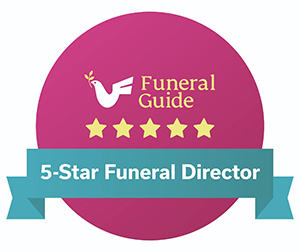When a loved one dies, one of the first things you’ll do is speak to a funeral director. It’s true, you can arrange a funeral yourself, even move the body yourself, but an experienced funeral director takes away the stress at what is usually a hugely emotional time.
You might forget paperwork, or some other small but crucial detail. Do you want to measure the body to get the right size coffin? You can choose to do any part or all of the process yourself, but you must also learn an unfamiliar area of regulation, parts of which may be time sensitive.
Using someone who knows what to do and can do it objectively saves you time and worry, both of which are priceless.
Do I Need to Arrange a Funeral at All?
You need to be buried or cremated, but do you really need a funeral?
In 1982 Psychologist William Worden wrote about the Four Tasks of Grieving. He identified four stages of the grieving process you must embrace to help you move past the feelings of grief. These tasks are now replacing the Kubler-Ross 5 stages of grief model, which has been widely misinterpreted.
Four Tasks of Grieving (this process also works effectively in other areas, for example redundancy or divorce):
- Accept the reality of the loss – it’s the only way to move on. Denial is a way of protecting yourself from being overwhelmed, but too much will cause you more problems in the long run.
- Experience the grief – it’s ok to grieve, or be upset, but don’t hide from it or hang on to it. The important thing is to hear your grief out, then let it go.
- Adjust to a world without the deceased being there – life has changed but thinking that if you move on it’s a form of betrayal simply isn’t true. Adapt to your new world.
- Keep a permanent connection to your loved one, but begin a new life – keep the memories, cherish the good times and enjoy them. Focus on what was good. You can’t change the loss, but you can build a new life in harmony with the memories.
The act of having a funeral helps meet some of these grieving tasks, and it’s part of why a proper funeral ritual is so important and helpful when it’s done to your specific wishes. For some, having a permanent memorial to visit is also part of the grieving process.
The Role of the Funeral Director
The funeral director’s job is to oversee all elements of the funeral. You can choose the level of service you want, and most funeral directors will offer a selection of packages to choose from. The funeral director’s role includes paperwork, collecting and looking after the body and communicating with local authorities.
Today, funeral directors can manage most parts of a funeral, including organising the wake, flowers, vehicles and the hearse and music. A funeral director will usually be assisted by a funeral arranger, who will deal with the specific details under the guidance of a funeral director.
Being a funeral director is a blend of practical and emotional care that can also involve:
- Helping with emotional support
- Discussing the funeral wishes with the family
- Organising death notices
- Completing complex paperwork
- Taking donations on behalf of a charity (often an option now, instead of giving flowers)
If you want something hugely personalised, for example a unique hearse or coffin, your funeral director has the right contacts to help.
What to Look for in a Funeral Director
It’s important that you feel comfortable with your funeral director.
As funeral directors we have to get the right balance between providing professional advice and emotional support. You want the funeral to go smoothly. You don’t want it to add to the emotional stress. It’s why we focus on the details. A simple error can have devastating emotional consequences when people are grieving. So, it’s crucial to get the arrangements as perfect as they can be.
At S Stibbards and Sons Ltd we know that a deceased loved one is still an important person to you. And we consider how a funeral might be a crisis purchase – unless you’ve got a funeral plan in place. It’s understanding these little things that is so important in a funeral director.
Your funeral director should provide transparency about their services too. It will set your mind at rest, leaving you to grieve and not worry about the funeral ceremony.
Our funeral directors are also there to provide support and guidance in planning for your own funeral, even if you don’t know when it will be. For example, you might need information on a pre-paid funeral plan or want to know all the choices available for your own funeral.
A funeral director can also play a supportive role after the funeral too. This might include:
- Arranging for the scattering of the ashes
- Officially thanking mourners by sending ‘thank-you’ cards
Highest Standards with Us
As a member of the National Association of Funeral Directors S. Stibbards and Sons Ltd is committed to upholding the highest standards in the industry and will always work with integrity and respect for both you and your loved one. The funeral will be a fitting tribute to your loved one, at a price you are comfortable with.
You need a funeral director who listens and can understand what you want for your loved one’s funeral.
“Mostly, the best funeral directors are good independents. They are likely to be less expensive and offer a higher level of personal service.” The Good Funeral Guide
S. Stibbards and Sons Ltd
We’re a family run firm that started in 1867. That more than 150-year experience means we have gained a unique insight into funerals, and understand the practicalities and the emotional support you need to grieve properly and send off your loved one in the way you and they want.
We offer a 24-hour service, 365 days a year, providing you with advice on what needs to be done and which people you need to contact.







